What Businesses Need to Know About Abatement of Civil Penalties

If the recent economic climate forced you to be delinquent on payroll tax liabilities, you still need to remit these trust fund taxes. Because these funds belong to your employees, the IRS considers not filing paying them as stealing—and it will penalize you severely.
Not remitting the funds is a civil penalty imposed by IRC section 6651 or 6656 that carries a price tag of 100% of the tax liability. This penalty is assessed against anyone who is personally responsible for remitting payroll taxes—which will make running your business even more difficult.
The harsh consequences can seem unfair: business was floundering, cash flow virtually nonexistent and you may have even been in the process of losing your home to keep your business afloat. Naturally, you were going to pay the business bills that demanded immediate attention, namely employee wages, rent, and utilities. Everything else, including those payroll liabilities, had to wait while your company rode out the economic hard times.
The IRS will exact the civil penalty on the person(s) responsible for remitting payroll taxes whenever its assessment shows “willful neglect.” The IRS has a policy that financial difficulties alone can never constitute reasonable cause for abatement of penalties.
Well, there’s hope in the form of a history lesson.
Around 1976 a clothing manufacturer called East Wind Industries created clothing and goods for the military. The business got into financial trouble when it started bribing government employees when competing for federal contracts. If it failed to pay the bribes, it didn’t get the contract or its goods were rejected. So the bribes were not deductible business expenses, but they were definitely an ordinary and necessary business expense.
In 1984, East Wind contacted government investigators and cooperated to help end the corruption. But during this time, it suffered financially and had to file Chapter 11 bankruptcy and, despite a damages award from the government, went out of business by 1988.
The company continued to pay employees during the financial strains, but did not always pay payroll taxes. In the end, they used the damages award to pay the outstanding payroll tax liabilities plus penalties then sued for a refund of the penalties. After all, it wasn’t like the principals of East Wind had been taking lavish vacations and otherwise spending money that should have been allocated to paying the payroll taxes. They were strapped financially and paying the bills that kept the company going.
Even so, the court did not find in the company’s favor, saying that financial difficulties alone can never constitute reasonable cause for abatement of the penalties. This was based on the court case Brewery, Inc. v. United States, 33 F.3d 589 (6th Cir.1994)
But the company appealed—and won. The appeals court rejected the bright line test of Brewery. The bright line rule is a clearly-defined rule composed of objective factors and doesn’t leave room for interpretation. The purpose of a bright line rule is to produce predictable and consistent results in its application. The appellate court dismissed the idea of using the bright line rule and instead looked at the facts and circumstances of the case. It determined that there was no conscious, willful neglect, intentional failure, or reckless indifference in East Wind’s failure to pay the payroll tax liabilities. It felt that East Wind had exercised ordinary business care and prudence. The court found that the company’s choice to pay creditors, whose services were necessary to keeping their business afloat, could not be construed as willful neglect. Further, the court felt that penalizing a business under these conditions could cause them to go under and this would negatively impact the economy and tax collections in general.
So if this sounds like your situation and you are facing steep penalties then step up to see if the penalties can be abated.



















